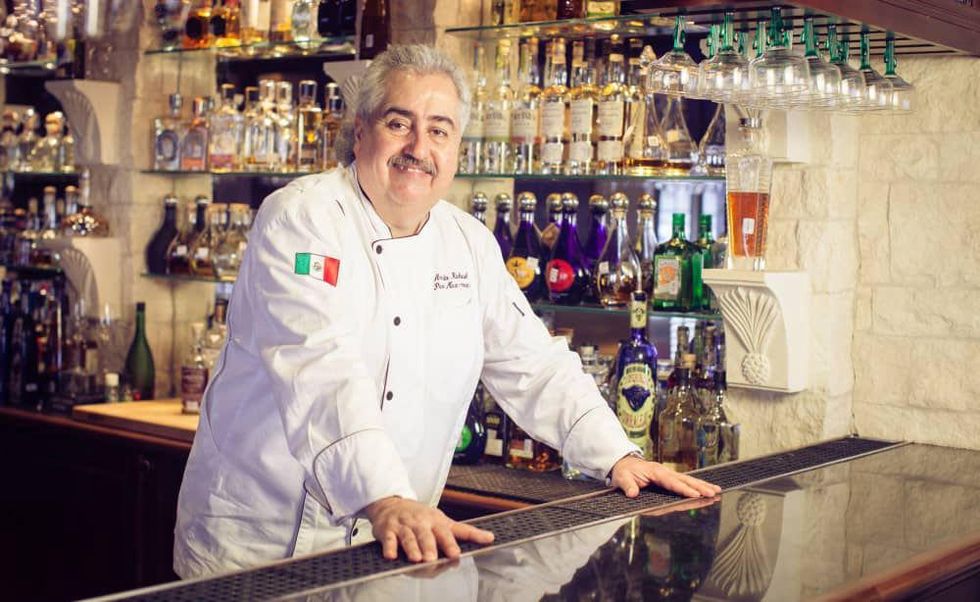THRIVE-ing with Bright Beginnings
Financially stable families and success in schools are the keys to Houston'sfuture
 United Way’s Anna Babin and Rich Kruger, president of ExxonMobil Production Co.,celebrate the 10th anniversary of United Way Bright Beginnings with youngstersfrom area centers. United Way of Greater Houston and ExxonMobil founded theprogram to help improve school readiness for children.
United Way’s Anna Babin and Rich Kruger, president of ExxonMobil Production Co.,celebrate the 10th anniversary of United Way Bright Beginnings with youngstersfrom area centers. United Way of Greater Houston and ExxonMobil founded theprogram to help improve school readiness for children. Smiling faces of children from area United Way Bright Beginnings early educationcenters
Smiling faces of children from area United Way Bright Beginnings early educationcenters Christine Baldwin lived paycheck-to-paycheck and never thought she could build anest egg or save for a home for her family of four. With her United Way THRIVEclasses and financial counseling, she learned budgeting, opened a matchedsavings account and even applied for and got a promotion at work.
Christine Baldwin lived paycheck-to-paycheck and never thought she could build anest egg or save for a home for her family of four. With her United Way THRIVEclasses and financial counseling, she learned budgeting, opened a matchedsavings account and even applied for and got a promotion at work. Attending home ownership and financial literacy courses through United WayTHRIVE made all the difference for Taghi and his family, who were finally ableto purchase a home.Photo by Felix Sanchez
Attending home ownership and financial literacy courses through United WayTHRIVE made all the difference for Taghi and his family, who were finally ableto purchase a home.Photo by Felix Sanchez
Editor's Note: In celebration of Houston's 175th anniversary, we asked leaders to imagine the city's future. In this essay, United Way of Greater Houston president/CEO Anna Babin highlights two areas crucial to Houston's future success.
Houston is a dynamic city full of opportunities. At the same time, more than 100,000 working families with children currently live on annual incomes of $20,000 to $35,000 a year. These families often struggle to buy groceries each month or cover basic expenses. Many of them are among the one million people in Houston who have no health insurance.
If we can help these families achieve financial independence by increasing income, building savings and acquiring assets, imagine the positive impact that would have on their lives and on the economic vitality of our city.
We have an ongoing effort that is doing just that and it is called United Way THRIVE. This collaborative approach to serving people is based on sound research conducted by the Annie E. Casey Foundation, which found that families who receive the right combination of services, like help with employment, budgeting and financial service, are three to four times more likely to achieve a major economic outcome than clients receiving only one type of service.
From a community perspective, having 100,000 more working families who are financially stable would positively impact our city in so many ways — from raising the quality of our workforce to creating safer neighborhoods to reducing the strain on social services resources.
THRIVE provides families with good financial education so they can learn sound saving and budgeting habits. It provides game-changing help like job training and support services that remove barriers to finding better employment or starting a small business. It provides financial counseling and services like free income tax preparation so that low-income working families can maximize their tax refund. In short, it’s a hand up, not a handout.
Last year alone, the free tax preparation initiative, staffed by trained, dedicated Houston volunteers, helped 28,000 families and returned $37 million to our local economy. Imagine the economic power of this program if we can double or triple the number of families who get free tax preparation over the next five years!
One goal for our Vision 20:20 plan, which was created by leading volunteers, donors and agency partners, is to help 100,000 working families achieve financial stability by expanding the United Way THRIVE model. We know it works, because in the third year we have helped 35,000 families gain greater financial stability and achieved a 10:1 return to the local community on the investment in THRIVE services. Scaling up the effort will take support from the Houston business community, more resources and a wider network of collaborative THRIVE partners, but we know it is possible.
From a community perspective, having 100,000 more working families who are financially stable would positively impact our city in so many ways — from raising the quality of our workforce to creating safer neighborhoods to reducing the strain on social services resources. It would enhance Houston’s reputation as a great place to live, work and raise a family — an opportunity city for all. My hope is that more businesses and individuals in our community will seize the power of this vision and join the effort to help working families thrive.
Academic Success for Children
In addition to helping families achieve financial stability, we believe that a key way to create lasting, positive change for Houston is to improve the academic success of our children. These two goals are key to the city's progress over the next 10 years and are highlighted in the United Way’s long-term strategic plan.
Our city’s future begins in our classrooms. A troubling statistic is that one in three Houston children do not graduate from high school. We have to do a better job of helping our young people achieve academic success. How else can we ensure that that a new generation will be ready to fuel Houston’s continued growth and prosperity in a global marketplace?
A troubling statistic is that one in three Houston children do not graduate from high school. We have to do a better job of helping our young people achieve academic success.
We don’t have all of the answers to the complex challenges of education. But we can offer one solution that we know will help: Start early.
Between birth and age six is a critical time for a child’s brain development and for achieving developmental milestones that provide a solid foundation for learning. The National Dropout Prevention Center/Network reports that children who participate in quality early education typically perform better in school and have a higher rate of high school graduation than those students who did not.
Ten years ago United Way of Greater Houston and ExxonMobil founded an early education initiative called United Way Bright Beginnings. This innovative early childhood program combines high quality teacher training with developmentally appropriate curriculum, equipment and supplies to create engaging, effective hands-on learning environments for children. The initiative focuses on serving children from low-income families who face added obstacles to learning like hunger and poverty.
We know these students are doing better as a result because, compared to their peers, United Way Bright Beginnings students scored higher on standard achievement tests in non-verbal reasoning and problem solving. They also performed better on 12 of 16 standardized achievement tests.
I have visited several local Bright Beginnings centers and I can tell you firsthand that the children exhibit an excitement about learning that is infectious. It is an uplifting experience.
Bright Beginnings outcomes illustrate why we must make quality early education available to every child in Houston. We need to create opportunities and incentives for child care teachers to get the child development training and education they need to inspire and prepare eager young minds. Let’s ensure that our early learning centers have good tools and safe environments to support that work. Educating parents about what quality early education means to their children must also be integral to this effort.
I would ask all those who care about Houston’s future to help make quality early education for all children an important priority. We already know that bright futures start with bright beginnings.
Of course, as we create our vision for the future, the long term goals of the United Way will continue to include support for the entire circle of life in our community—youth, seniors, families and people rebuilding their lives.





